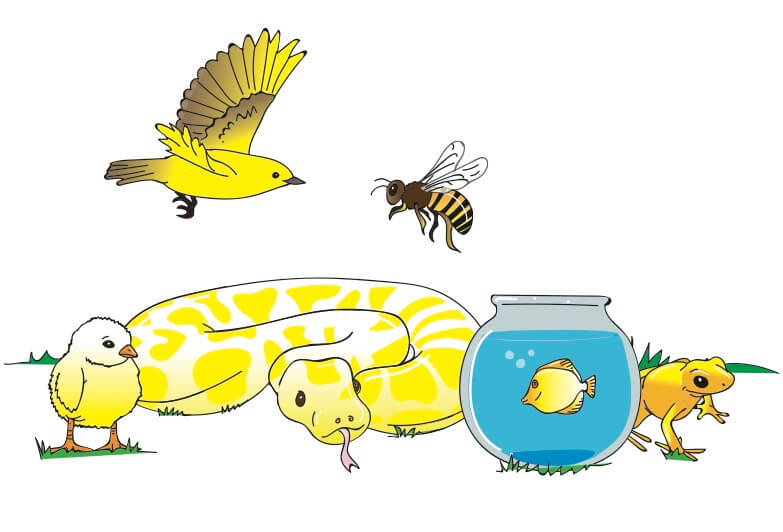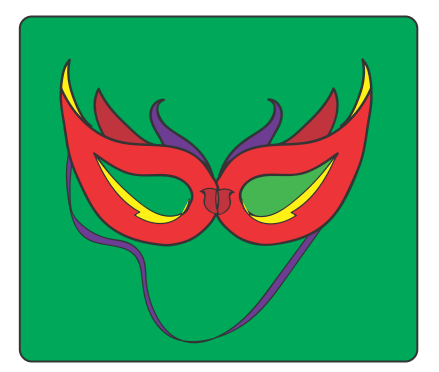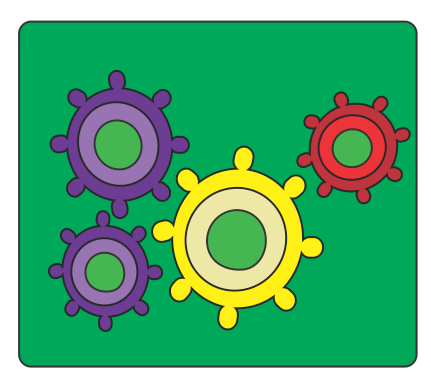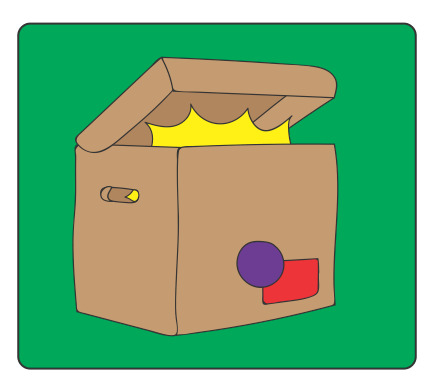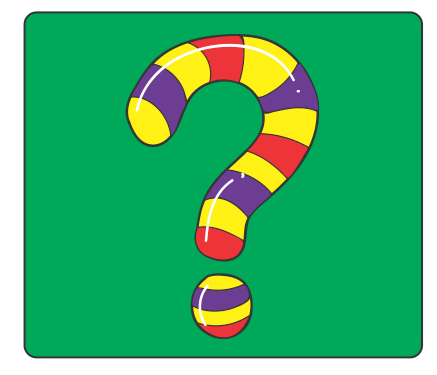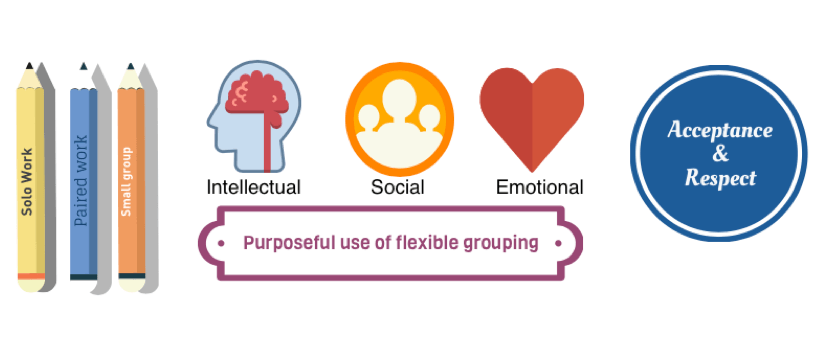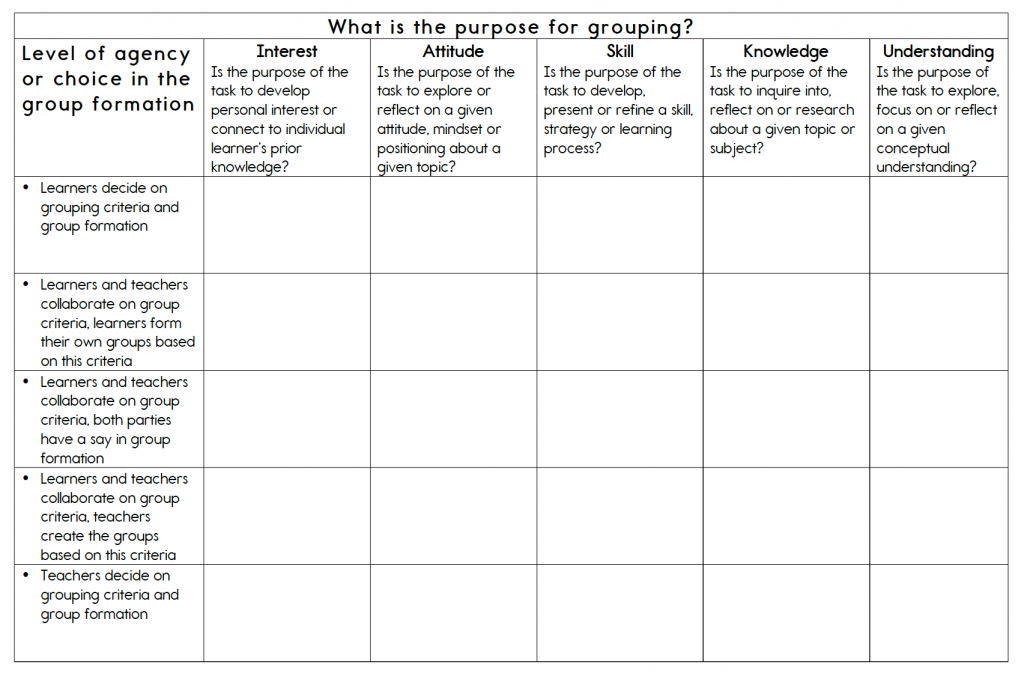ABC of INQUIRY – GROUPING
ABC of INQUIRY – GROUPING “Never doubt that a small group of thoughtful, committed citizens can change the world; indeed, it’s the only thing that ever has.” Margaret Mead
GROUPING: Let’s get together…
There are many forms of grouping in learning engagements and many purposes for grouping learners. Traditionally the teacher was in charge of grouping choices, however as we explore and reflect on the learning process, there are greater opportunities to let the learners determine the grouping’s size, purpose and defining features. Grouping can also be about the amount of choice and movement involved in where students sit in the classroom. Grouping shouldberevisited and the criteria for group formation redefined every time there is a new purpose or learning engagement.
Traditionally there was a push to make sure grouping was based on student levels of understanding or skill, or to ensure that there was a mix of genders and personalities. The tricky aspect of grouping like this is that it can pass on mixed messages about limits in regard to abilities, or create tension-filled spaces as members clashed for a variety of reasons. Levelled grouping can work and is necessary sometimes, but it is important that the learners are aware of the purpose and opportunities these groupings can offer. Levelled grouping need to be kept to a minimum and only used if it offers something constructive socially, emotionally and academically for all involved.
So called ‘random’ groupings that are actually rigged to create groups that suit the teacher, teach the learners that ‘subterfuge’ is an OK way to get a preferred outcome.
Dr. Brian Cambourne suggests that there are multiple opportunities that can be provided to support students in choosing different or diverse ways to…
- Approach and process a problem
- Create and develop a range of acceptable and plausible products/ answers
- Share and collaborate with peers
All of these areas can inform how teachers support and scaffold agency in grouping opportunities.
Grouping where learners have a genuine say, will often involve less micromanagement and support constructive learning opportunities to become a reality. Here are some pointers when thinking about grouping opportunities in a learning process:
WHO- Opportunities for genuine agency exist in group formation, when students are encouraged and allowed to participate and guide the decisions connected to who they work with.
-
- Who is going to be impacted on by the grouping?
- Who will have a say in how the group is formed?
- Who will have a say in how the group works together?
HOW- Students who are encouraged to reflect on their current skill or strategy preferences and then use these to guide criteria to form groups, could form groups that work cohesively because of a balance or shared preferred learning style. Opportunities for agency are added when students can negotiate the preferred learning processes or strategies used to inquire into ideas or a topic, or when they have a shared vision or goal about what skills they want/need to develop
- How will the skills, ideas be developed, explored or reflected on?
- How will the groups work together?
- How will different strategies be used by different groups?
WHAT – Grouping choices can be connected to the inquiry content. Opportunities for learner agency exist when learners can choose a mini topic or focus within a larger inquiry that interests them and then form groups based on this shared interest.
- What content needs to be inquired into?
- What content interests you?
- What tools, resources, information need to used or accessed?
WHY- Grouping choices can be connected a key concept or understanding that learners are interested in pursuing or inquiring into further. Learner agency can be supported when learners collaborate or form groups based on a given conceptual lens or a connection to learning in the world outside the classroom.
- Why are we learning this? What relevance does it have to your life outside the classroom?
- Which conceptual focus most interests or challenges you?
Learners can be involved in determining and setting the criteria to form a group and can generate an essential agreement to guide how the group works together.
Often collaborative learning is considered learning that uses predominantly grouped, paired or teamwork but this doesn’t always have to be the case. To work collaboratively means to work towards a common goal, so learners can work towards a common goal but they can do so individually and then share in a variety of ways to contribute towards a collaborative outcome.
It is important at the end of any major group work task that there is an opportunity for everyone in the learning community to debrief, reflect and revisit ideas, expectations, hopes and realities of the process, so that choices and ideas for the next group task can be refined and revised, each time developing and improving the constructive nature of group work. It is also critical that learners who feel negatively impacted on by a lot of group work are always given the chance to work alone and perhaps just regroup to summarise or synthesise ideas. Digital technology, can also be used to really support those learners who prefer to work in solo ways to contribute to group work without the pressure of actually having to deal with all the face to face dynamics and politics that are at play during group work.
*BCW will now use ‘They, their — themself’ as a singular, gender-neutral pronoun in all subsequent material generated on our website.
All Rights Reserved © 2018 Beconwiz All ideas and illustrations are the property of BeConWiz.

BeConWiz Ideas and Thoughts by Carla Holmes, Mary-Denese Holmes, Pearl Holmes is licensed under a Creative Commons Attribution-NonCommercial-NoDerivatives 4.0 International License.
Based on a work at https://beconwiz.com.
Permissions beyond the scope of this license may be available at https://beconwiz.com.
